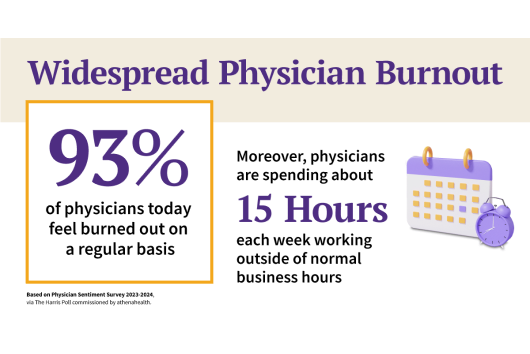
What You Should Know:
– 93% of physicians are experiencing regular burnout, spending an average of 15 extra hours per work outside normal hours, according to athenahealth’s latest Nationwide Physician Sentiment Survey.
– The athenahealth Physician Sentiment Survey provides valuable insights into the current state of American healthcare. Addressing the challenges highlighted in the survey is crucial to ensuring the well-being of both doctors and patients, while harnessing the potential of technology like AI responsibly can be a valuable tool in improving healthcare delivery.
Physician Burnout at an All-Time High: athenahealth Survey Reveals Alarming Trends
The athenahealth survey paints a disturbing picture of widespread physician burnout, fueled by excessive administrative workloads, staffing shortages, financial pressures, and rising patient expectations. This chronic stress is leading many doctors to consider leaving the profession altogether, posing a significant threat to the future of healthcare.
Key findings of the study include:
– Burnout Epidemic: 93% of surveyed physicians experience regular burnout, spending an average of 15 extra hours per week working outside normal hours.
– Financial Woes: Only 38% believe their practice is financially stable, and half felt unable to deliver quality care due to volume and cost pressures.
– Data Overload: While 94% value having the right clinical data, 80% believe excessive information creates stress and contributes to burnout.
– AI Offers Promise: 83% see AI as a potential solution, with those optimistic about AI reporting less burnout and a more positive outlook on healthcare’s direction.
– Human Touch Concerns: 60% worry about losing the human touch with AI, emphasizing the need for AI to focus on administrative tasks and not replace human interaction.
Financial Challenges
The survey also highlights the financial struggles faced by many practices, with only 38% feeling financially secure. This vulnerability often leads to compromises in quality care, with half of physicians reporting instances where volume and cost constraints prevented them from delivering optimal care.
AI as a Potential Solution
Despite the challenges, there is a glimmer of hope in the form of AI. 83% of physicians believe AI could eventually help address many of healthcare’s problems. Despite optimism, 40% fear AI is overhyped and won’t live up to expectations, while 42% worry it will further complicate healthcare.
Focus on Solutions
The survey underscores the urgent need for solutions to address physician burnout and the financial challenges facing practices. This includes:
– Reducing administrative burdens: Streamlining workflows and utilizing technology to free up doctors’ time for patient care.
– Improving financial sustainability: Exploring alternative payment models and providing resources to help practices manage costs effectively.
– Leveraging AI responsibly: Implementing AI solutions that enhance efficiency and accuracy while preserving the human connection in healthcare.
“One of the top concerns physicians have with regard to AI is the potential loss of human touch; that is an incredibly important signal to which we need to pay attention,” said Dr. Nele Jessel, chief medical officer of athenahealth. “In order for physicians to fully benefit from technology as a care enhancement tool, they need to experience more advantages and fewer added complexities or burdens. If we get this right, we’ll be using the technology to reduce administrative work and increase efficiencies in ways that allow physicians to refocus on their patients.”
Methodology
The third athenahealth Physician Sentiment Survey was conducted online within the United States by The Harris Poll on behalf of athenahealth from October 23 – November 8, 2023. The online survey interviews lasted approximately 12-13 minutes and were conducted among 1,003 physicians (750 PCPs and 253 Specialists), of whom only five percent use athenahealth’s EHR. Where applicable, the results are compared to the Baseline study that was conducted from January 4-26, 2022, among 743 practicing physicians. athenahealth’s sponsorship of the study was not revealed.

